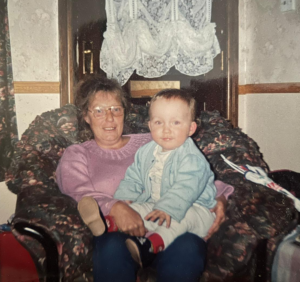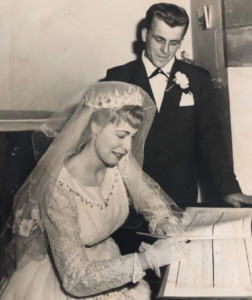Grandson calls for south London volunteers for dementia research
Dementia Action Week (15-21 May) is an annual awareness-raising campaign. This year’s theme is getting an earlier diagnosis of the condition. Lewis Deakin, a communications manager at the National Institute for Health and Care Research (NIHR) has written this blog in memory of his grandmother Edna for Dementia Action Week.
Edna’s story
Dementia is cruel. In 2011, my lovely grandmother, Edna, was diagnosed with vascular dementia after battling back from a stroke and heart attack. Vascular dementia is estimated to affect 150,000 people in the UK, and it is caused by reduced blood flow to the brain.
My nan had a heart of pure gold. You could talk to her about anything, and she’d give you very honest and often funny takes on any topic with her wicked sense of humour. The hours would fly by as we’d talk and talk.
She loved nothing more than spending time with and looking after her grandchildren. Like any grandmother, she would also regularly offer me food. I loved her cooking, but I had to insist that I couldn’t eat anything else after a while. When it was time for me to go home, I’d find she’d sneakily packaged the food and given it to my dad to take away. Even at 16, she’d insist on walking me home, even though I lived only 15 minutes away, and a Sunday dinner was always made for me without fail.
My nan died from vascular dementia in 2018. It was heartbreaking to watch over many years as this lively, quick-witted, bubbly woman who was a true lover of life and conversationalist struggled to communicate with her loved ones. Dementia made her feel scared in her own home and, in her clearer moments, very sad about being unable to talk to people. She was incredibly friendly and generous and loved nothing more than talking to anyone. However, once she started, you wouldn’t easily be able to end the conversation, which is a trait I’m proud to continue with anyone who talks to me!
Spreading the word about research
I’ve worked for the NIHR for five years because I want to honour my nan’s memory by trying to help researchers get their key messages out there to advance their research to the point where
dementia, cancer, cardiovascular disease and others can be consigned to the history books as the UK’s biggest killers. My sincere wish is that in the future, there will be no need for Dementia Action Week.
However, dementia affects around 55 million people globally. This figure could even reach 139 million by 2050 without an effective treatment, according to Alzheimer’s Disease International, which shows there is still significant work to do to turn the page on dementia.
There isn’t a week when I don’t think of my nan and wish she was still here. I try to keep her memory alive through my work with the NIHR, particularly when interviewing people. Recently securing media coverage about dementia in the Evening Standard was a source of immense pride as I supported someone also acting to honour their grandparent. I hope my nan is proud of everything I’ve done and continue to do.
If you have five minutes spare, please, as part of Dementia Action Week, consider registering your interest in vital dementia research to help researchers via the Join Dementia Research website. You could make a huge difference for future generations.


